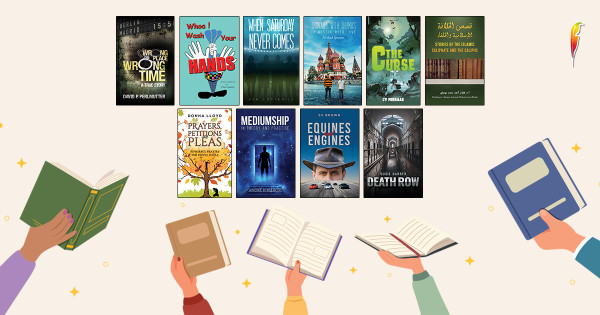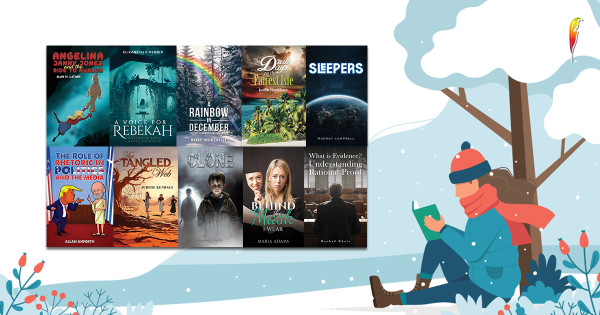
Using Social Media to Boost Book Sales: Strategies for Success
In today’s digital-first world, authors have an unparalleled opportunity to connect with readers and promote their books through social media. The landscape of publishing has evolved dramatically, with social media becoming a powerful tool for building an author’s brand, engaging with readers, and ultimately increasing book sales. While traditional marketing channels still hold value, social media offers a direct, personal, and often cost-effective way to reach a global audience.
Whether you're an indie author self-publishing your first novel or a seasoned writer with a traditional publisher, learning how to harness the potential of social media can be a game-changer. This blog will explore effective strategies for selecting the right platforms, engaging your audience, creating impactful content, and maximising your book’s visibility through social media marketing.
1. Choosing the Right Social Media Strategy
To successfully boost your book sales through social media, you need a strategy that ensures you're visible and active on platforms that matter most to your audience. While it’s tempting to focus on one platform, in today’s digital age, being active on multiple relevant social media platforms can significantly increase your reach and book sales. Your readers are scattered across various platforms, and each platform offers unique opportunities for connecting with them.
The key is to ensure consistency in your presence and messaging across platforms. From visually appealing posts on Instagram to book discussions on Twitter or short, engaging videos on TikTok, each platform offers unique ways to reach readers. Adapt your content to fit the platform, but make sure your overall branding and message remain consistent.
Pro Tip: Instead of focusing on just one platform, develop a multi-platform strategy to reach a broader audience. By tailoring your content to fit each platform's strengths, you increase your chances of connecting with different reader segments and boosting your book sales. Use tools like Hootsuite or Buffer to streamline posting across platforms and maintain a cohesive presence.
2. Engage with Your Audience
Building relationships with your audience is one of the most important aspects of social media marketing. Engaging with readers, responding to their comments, and participating in conversations around your genre can foster a sense of community and loyalty.
• Respond to Comments: Whether readers are commenting on your posts, sending you direct messages, or mentioning you in their own content, always take the time to reply. Readers appreciate authors who engage with them personally, and this interaction can turn a casual reader into a dedicated fan.
• Run Polls and Ask Questions: Social media platforms like Instagram and Twitter allow you to run polls and ask questions directly within posts or Stories. This can be a fun way to engage readers, whether you're asking them about their favourite characters, seeking feedback on potential book cover designs, or simply sparking discussions about their reading habits.
• Join Book Discussions: Many readers and authors participate in book-related groups or communities on platforms like Facebook and Goodreads. Joining these groups and participating in discussions about your genre is a great way to engage readers without pushing your book directly. Readers who recognise you as part of the community are more likely to show interest in your work.
Pro Tip: Authentic engagement is key. Readers can tell when an author is genuinely interested in their thoughts and opinions. Show appreciation for your readers and avoid coming across as solely focused on sales.
3. Create Engaging and Relevant Content
Social media thrives on engaging, shareable content. To boost your book sales, you’ll need to create content that resonates with your audience and inspires them to share it with others. However, content creation isn’t just about promoting your book—it’s about providing value, entertainment, and insights that keep readers coming back for more.
• Share Snippets and Teasers: Give your audience a taste of what they can expect from your book by sharing excerpts, character quotes, or teaser trailers. This helps to build anticipation and keeps readers curious about your upcoming release.
• Behind-the-Scenes Content: Readers love to feel like they’re part of the writing process. Sharing behind-the-scenes content, such as photos of your writing space, insights into your creative process, or stories about how you developed certain characters, can make your audience feel more connected to your work.
• Visual Content: Images and videos are the most shared content on social media. Book cover reveals mood boards and even short video clips (like TikToks or Instagram Reels) can be highly engaging. For example, create a book trailer or a visual journey of your book’s setting.
• Author Q&A Sessions: Host live Q&A sessions on platforms like Instagram Live, Facebook Live, or Twitter Spaces where readers can ask questions about your writing process, the inspiration behind your book, or even your favourite authors. These sessions are a great way to connect with your audience in real-time.
Pro Tip: Be consistent with your content. Whether it’s posting weekly writing tips or monthly updates about your book’s progress, consistency will keep your audience engaged and eager for more.
4. Utilise Paid Advertising
While organic social media engagement is important, it can only take you so far. To reach a broader audience, consider investing in paid advertising on platforms like Facebook, Instagram, or Twitter. Paid ads allow you to target specific demographics, including readers of similar books, people interested in your genre, or even individuals who have visited your website before.
• Boosted Posts: Boosting a post allows you to amplify your reach by promoting it to a larger audience. This is a simple way to promote key posts, such as a book launch announcement or a limited-time sale.
• Targeted Ads: Facebook and Instagram’s advertising tools allow you to target specific audiences based on their interests, location, age, and even their online behaviour. For instance, you can target people who have engaged with other authors in your genre or have recently bought similar books.
• Book Pre-Order Campaigns: If you’re planning a book release, running a pre-order campaign using paid ads can help build excitement and generate early sales. Offer exclusive bonuses or discounts for readers who pre-order your book through these ads.
Pro Tip: Start with a small budget to test different types of ads and audience targeting before scaling up your investment. Monitor performance metrics like clicks, engagement, and conversions to optimise your campaigns.
5. Build a Community with Hashtags and Challenges
Hashtags and social media challenges are excellent ways to increase the visibility of your posts and tap into larger reader communities. Platforms like Twitter, Instagram, and TikTok make it easy for authors to join trending conversations and interact with readers through the use of hashtags.
• Use Genre-Specific Hashtags: Hashtags like #BookLovers, #AmReading, #Bookstagram, and #IndieAuthors are widely used across social media. Including relevant hashtags in your posts helps you reach readers who are searching for books in your genre.
• Create a Hashtag for Your Book: When you’re promoting a book, create a unique hashtag that readers can use when discussing your work. This can help create a sense of community around your book and make it easier for you to track reader reactions and reviews.
• Participate in Social Media Challenges: Readers love to engage in challenges, and you can create or participate in challenges that relate to your book. For example, if you’ve written a fantasy novel, you might participate in the #FantasyFebruary challenge on Instagram where readers and authors share their favourite fantasy reads.
Pro Tip: Stay updated on trending hashtags and challenges in your genre. Engaging with these trends can expose your book to a wider audience and increase your visibility on social media.
6. Collaborate with Influencers and Bloggers
Collaborating with book influencers and bloggers can be an effective way to increase your reach and credibility. Bookstagrammers, BookTubers, and BookTokers have large followings of readers who trust their recommendations. If you can get them to review or promote your book, it can lead to a significant boost in sales.
• Offer Advance Review Copies (ARCs): Reach out to bloggers, reviewers, and influencers to offer them ARCs of your book. This allows them to read and review it before the official release, creating buzz and anticipation among their followers.
• Host Giveaways: Collaborate with influencers to host a giveaway for your book. This not only increases engagement but also incentivises readers to follow you and spread the word about your book.
Pro Tip: When collaborating with influencers, ensure that their audience aligns with your target readers. A focused approach will yield better results than casting a wide net. Look for influencers who engage with readers in your specific genre, as their recommendations will carry more weight with your ideal audience.
7. Leverage User-Generated Content
User-generated content (UGC) is a powerful tool in the world of social media marketing. When readers post about your book, share reviews, or create fan art, they are essentially doing your marketing for you. This type of organic promotion not only boosts your credibility but also encourages more engagement from potential readers.
• Encourage Readers to Share: Ask your readers to post photos of themselves with your book, share their favourite quotes, or leave reviews on social media. Offer incentives, such as a chance to win signed copies or exclusive content, to motivate readers to participate.
• Feature UGC on Your Own Platforms: Sharing reader-generated content on your social media pages or website is a great way to build a sense of community. It shows that you value your readers and appreciate their support, which can lead to even more UGC being created.
Pro Tip: Run a specific campaign or contest encouraging readers to create content related to your book, such as “fan fiction” challenges or themed photo competitions.
8. Use Analytics to Refine Your Strategy
One of the advantages of social media marketing is the ability to track and measure the performance of your campaigns. Most social media platforms offer built-in analytics tools that provide insights into your audience, engagement levels, and the effectiveness of your posts.
• Track Engagement Metrics: Pay attention to metrics such as likes, shares, comments, and click-through rates. These will help you understand what type of content resonates most with your audience and where you might need to adjust your strategy.
• Adjust Based on Performance: If certain types of posts (like teaser trailers or behind-the-scenes content) are performing well, create more of that content. On the other hand, if a particular platform isn’t delivering results, it may be time to refocus your efforts elsewhere.
Pro Tip: Use external tools like Google Analytics to track traffic from social media to your book’s sales pages. This will give you a clearer picture of which platforms and posts are driving actual sales.
9. Build a Strong Email List Alongside Social Media
While social media is excellent for building engagement, an email list remains one of the most reliable ways to market directly to your readers. Social media platforms may change their algorithms or policies, but your email list is yours to control.
• Integrate Social Media with Email Marketing: Use social media to grow your email list by offering exclusive content, such as free chapters, short stories, or bonus materials for subscribers. Promote these incentives across your social media platforms to encourage followers to join your mailing list.
• Drive Traffic from Social Media to Your Sales Funnel: Once readers are on your email list, you can nurture them through email campaigns, leading to increased book sales over time. This combination of social media engagement and email marketing creates a powerful, multi-channel marketing strategy.
Pro Tip: Share email sign-up forms directly on your social media platforms to make it easy for readers to subscribe.
10. Stay Authentic and Patient
Finally, the most important aspect of using social media to boost book sales is to stay authentic. Readers can easily spot inauthentic promotion, and they’re more likely to engage with authors who are genuine in their interactions.
• Be Yourself: Share your personality, your writing journey, and the ups and downs of being an author. Readers love to see the human side of authors, and building an authentic connection can turn followers into loyal fans.
• Be Patient: Social media success doesn’t happen overnight. It takes time to build an engaged audience, and book sales may not skyrocket immediately. Focus on building relationships and delivering value to your readers, and the sales will follow.
Pro Tip: Authenticity and consistency are key. Show up regularly, stay true to your voice, and trust the process. Your audience will grow as you build trust and deliver content that resonates.
Social media offers a wealth of opportunities for authors to connect with readers, build their brand, and boost book sales. By choosing the right platforms, engaging with your audience, creating valuable content, and leveraging both organic and paid strategies, you can significantly increase your book’s visibility and reach in today’s competitive market.
Remember, social media marketing for books is about more than just promoting a product. It’s about building a community around your work, fostering relationships with your readers, and sharing your journey as an author. With persistence, creativity, and an authentic approach, you can turn social media into a powerful tool for your book’s success.
Connect with Austin Macauley Publishers for the best fantasy book series and blogs, and submit your manuscript if you want to publish your work. You can also make a quick and easy submission through the online submission form. You can stay updated with our new releases and activities by joining our family of authors and readers on Facebook, X, TikTok, and Instagram.
We use cookies on this site to enhance your user experience and for marketing purposes.
By clicking any link on this page you are giving your consent for us to set cookies



